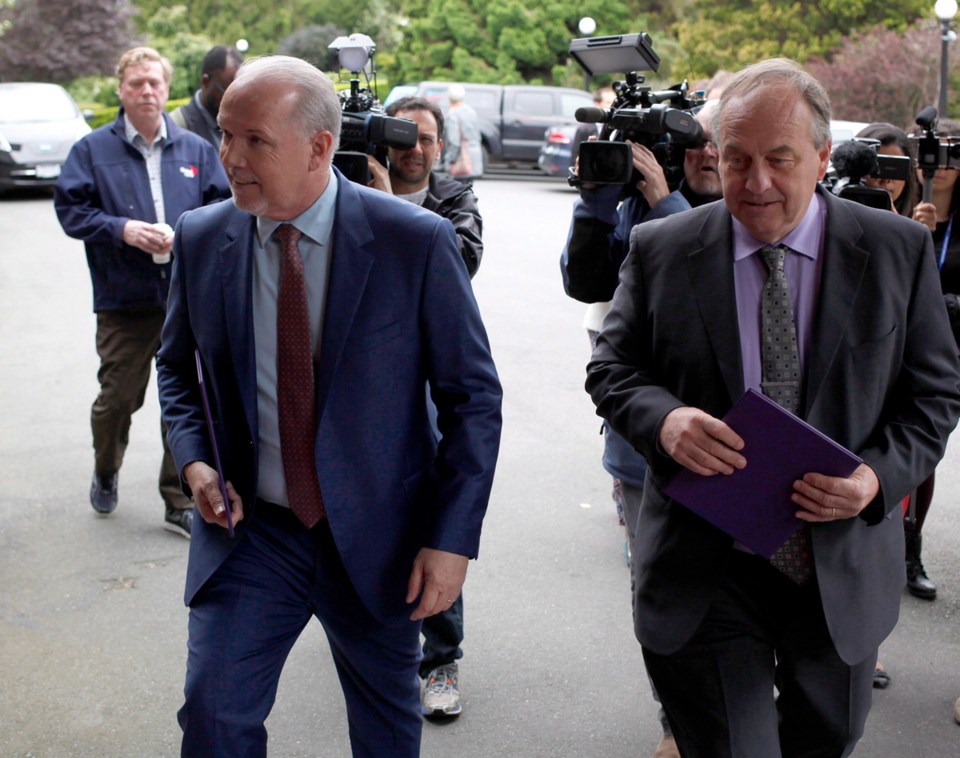B.C. NDP Leader John Horgan repeated his call Thursday for Liberal Premier Christy Clark to bring back the legislature as soon as possible to allow for a swift transition to a new government.
Horgan and B.C. Green Party Leader Andrew Weaver have signed an accord to defeat Clark and install a minority NDP government. But the timeline for that to happen rests with Clark, who remains the premier with 43 seats to 41 for the NDP and three for the Greens. She has said she will recall the legislature this month.
“Myself and Mr. Weaver have demonstrated that we have majority support of those who have been elected,” Horgan said. “Most British Columbians, I think, expect that there should be a rapid transition to a new government so that we can deal with the issues that are so critically important to them.”
He cited the softwood lumber dispute and the ongoing overdose crisis as issues that require urgent attention by the next government.
The ongoing uncertainty differs from the usual transition of power after a general election, Horgan said this week. “Traditionally, when we have an election, there’s a winner on election night and the next day that group of individuals gets access to the transition documents that have been created by the public service to inform and advise and brief the incoming government,” Horgan said this week.
The NDP and Greens, however, have been denied access to that information, because the Liberals remain in power for now.
”If we were asked today to form the government, we have no information to base our decisions on,” Horgan said, after signing the deal with Weaver. “So there’s a lot of work that needs to be done that can’t be done until the current government … is defeated.”
Even so, people who have worked on previous government transitions say the NDP has likely done a lot of work behind the scenes to prepare for taking the reins.
Martyn Brown, who was former premier Gordon Campbell’s chief of staff when the Liberals took office in 2001, said Horgan will have a good idea who he wants in his cabinet. “I’d be surprised if he wasn’t already initiating interviews with MLAs,” Brown said.
Horgan also knows how many seats the NDP has, how the house will be aligned and where people will sit or have offices, Brown said. “The throne speech he could start writing right away; he wouldn’t need to really wait for that because it’s all high level.”
The entire process, however, is made more difficult without the briefing binders from the public service, particularly when it comes to gauging the province’s finances. “What he can’t do, obviously, is prepare for the budget, which is such a critical part when you first come to office,” Brown said.
In addition, the unpredictability prevents the NDP from offering people jobs, though the transition team will have identified potential candidates for key positions or, at least, have a short list, said former senior government officials who have assisted with transitions.
Scott Hennig of the Canadian Taxpayers Federation said an NDP government will have to replace a number of Clark’s political staff and pay severance. “That’s unavoidable,” he said.
But the severance costs risk getting out of control if incoming governments start replacing the heads of Crown corporations and agencies.
“In an ideal world, those people are not political appointees,” Hennig said. “Those should be the best people at managing a major corporation and not people that you need to switch when you change governments. But if that does happen, that’s where the pricey part is.”
He said Horgan might want to follow the example set by Alberta Premier Rachel Notley and start small. “I think the best thing that the Rachel Notley government did was start with a small cabinet,” Hennig said, noting that the Alberta NDP government began with just 12 cabinet ministers, including Notley. Limiting the size of cabinet keeps costs down and reduces the need to immediately hire a large number of people, he said.
In the meantime, B.C. government employees are doing their jobs, said Stephanie Smith, president of the B.C. Government and Service Employees’ Union.
She said her members are waiting like everyone else, with a mix of optimism and trepidation, to see how the transition unfolds. “They continue to do their jobs professionally. Services need to be met and delivered, but everybody’s in this odd place.”



